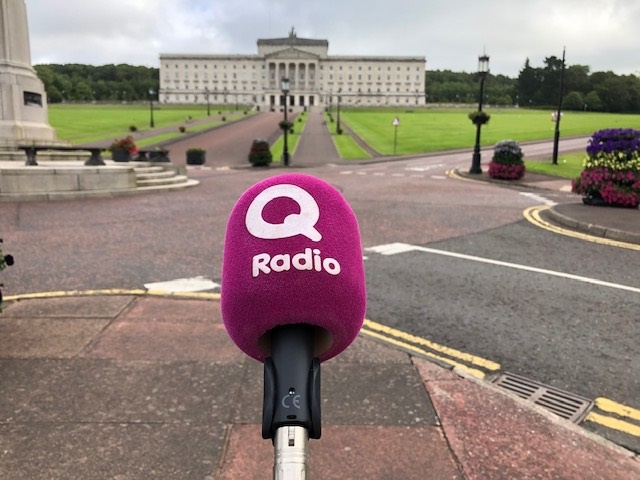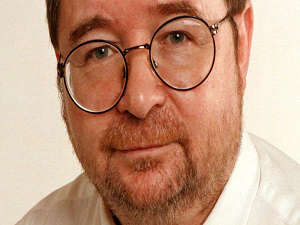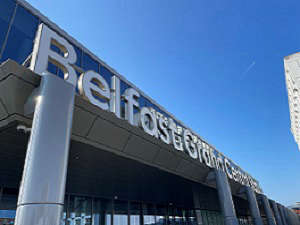
By David Young, Jonathan McCambridge and Rebecca Black, PA
The DUP would have difficulty reforming a Stormont Executive after the upcoming Assembly election if issues with the Northern Ireland Protocol are not resolved, its party leader has warned.
Sir Jeffrey Donaldson expressed doubts about the prospect of a short-term return to a fully-functioning devolved administration in the wake of the resignation of his party’s First Minister Paul Givan.
Sir Jeffrey’s decision to pull Mr Givan out of office is part of the DUP’s escalating protest strategy against the post-Brexit trading arrangements that have created economic barriers between Northern Ireland and the rest of the UK.
Mr Givan’s resignation, which came into effect at midnight, automatically removed Sinn Fein Deputy First Minister Michelle O’Neill from her position.
Other Stormont ministers can remain in post but the Executive can no longer meet and is unable to take significant policy decisions.
An Assembly election is already scheduled for May. Mr Givan’s departure raises the prospect of that poll being brought forward several weeks.
All ministers will leave their posts ahead of any election and a new administration could only be formed following the poll if the positions of first and deputy first ministers are filled by the largest unionist and largest nationalist parties.
Sir Jeffrey suggested the DUP would only return to an executive if its concerns around the post-Brexit trading arrangements are addressed.
“I’ve withdrawn the First Minister on the basis that the protocol issues have not been addressed despite clear commitments and promises given by the Prime Minister that they would be addressed, and clearly if the protocol issues are not resolved by the time of the election then, of course, it is difficult for us to form a government because of the instability that the protocol creates,” he told BBC Radio Ulster.
“I have made my position clear – I think there is now an opportunity for the Government and the EU to step up.
“The EU said consistently that the purpose of the protocol was to protect the political institutions, political stability and the Good Friday Agreement.
“Well, we know that isn’t happening because unionists do not consent to the protocol. There is no consensus for the protocol.
“There is now an opportunity for the UK Government and the EU to step up to the mark and to deliver an agreement that resolves these issues that can be done quickly.”
Sir Jeffrey insisted there is still a point in having an Assembly poll.
“I think the time has come for the people of Northern Ireland to have their say,” he added.
Announcing his resignation yestersday, Mr Givan said the protocol had undermined a cornerstone of powersharing – governance with the consent of both nationalists and unionists.
His statement came 24 hours after DUP Agriculture Minister Edwin Poots acted unilaterally to order a halt to agri-food checks at Northern Ireland ports required under the protocol.
Civil servants have yet to implement the instruction, pending legal clarity on their obligations, and checks are continuing. Mr Poots’s actions are also being challenged in the High Court in Belfast.
Mr Givan’s resignation removed Ms O’Neill from her job because, under Stormont’s powersharing rules, one cannot hold office without the other.
There was a flurry of activity within Mr Givan and Ms O’Neill’s joint office last night as the ministers pushed through some outstanding decisions before leaving office.
They confirmed the appointment of a new victims’ commissioner.
Ian Jeffers, who has extensive experience in the not-for-profit sector, will take up the post for a four-year term.
The ministers also reappointed Attorney General Brenda King for a further three-year term.
Ms O’Neill scheduled a virtual meeting with other political leaders on Friday morning to discuss ways to potentially expedite outstanding legislation through the Assembly before the looming election.
However, the Alliance Party and Ulster Unionists raised concerns that Ms O’Neill had not invited the DUP to the discussions.
The Sinn Fein Stormont leader subsequently issued an invite to Sir Jeffrey but it remained unclear on Friday who would ultimately log on.
Sinn Fein has denounced Mr Givan’s resignation as an electoral stunt designed to consolidate DUP support in the face of recent poor opinion poll performances.
The party’s Finance Minister Conor Murphy rejected claims of double standards, given Sinn Fein made a similar move in 2017 when the late Martin McGuinness resigned as deputy First Minister and collapsed the institutions amid a row over a botched green energy scheme.
Mr Murphy told Radio Ulster they were “two very different situations” and claimed the “scandal” over the Renewable Heat Incentive (RHI) scheme “would have brought down any coalition government in the Western world”.
Thursday’s events in Northern Ireland unfolded as UK Foreign Secretary Liz Truss and European Commission vice president Maros Sefcovic met to take stock of negotiations aimed at reducing the red tape associated with the protocol. The pair will meet again in London next week to continue discussions.
SDLP Infrastructure Minister Nichola Mallon said the focus should now be on passing remaining legislation at Stormont, rather than an early Assembly election.
“People in Northern Ireland have already been robbed of three years in this mandate when Sinn Féin collapsed things, now the DUP is trying to collapse things and rob people of the very little time that we have left in this mandate,” she told Radio Ulster.
“I think that we would best serve our citizens by doing our jobs and using every single minute that we have left to get the remaining legislation and regulation through the Assembly.
“An early election means a lot of that will fall.”
Alliance leader Naomi Long said the resignation of Mr Givan was a “fairly cynical electoral manoeuvre from the DUP”.
“It stops us being able to make progress for people in Northern Ireland and there comes a point where if we are going to be serious about politics we need to be able to work through our difficulties,” she told the BBC.
“I am not denying there is a problem, I have never denied there is an issue with the protocol.
“I think it is as a direct consequence of Brexit that we are in this mess, which the DUP campaigned for and supported.
“We need to be really clear about how we ended up where we are.
“I am not denying there is a problem, but that problem won’t be solved by the Northern Ireland Executive not being able to meet.”



 Two men arrested on suspicion of attempted murder after man found injured
Two men arrested on suspicion of attempted murder after man found injured
 Teenage driver arrested after passenger killed in collision
Teenage driver arrested after passenger killed in collision
 Two men remanded over murder of pensioner in Co Tyrone
Two men remanded over murder of pensioner in Co Tyrone
 Man arrested in O’Hagan murder probe charged with fraud
Man arrested in O’Hagan murder probe charged with fraud
 Kimmins ‘stands firm’ following row over station Irish language signs decision
Kimmins ‘stands firm’ following row over station Irish language signs decision